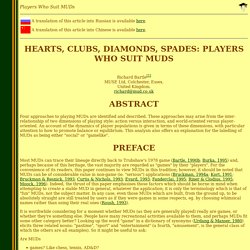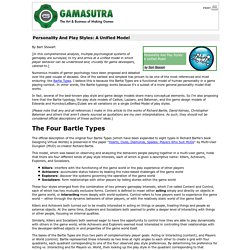

Why Online Games Turn Players Into Psychopaths. Screenshot: ysarts via Steam Community Three men stand on a deserted street, their hands in the air.

One wears a green T-shirt and a motorcycle helmet. The others wear bright yellow down jackets. They are surrounded by four armed men. “Gentlemen,” a man called Klyka says, “we are going to play a very interesting game.” He commands the hostages to drop their axes, then continues. “This is DayZ,” he says. He directs the men in yellow to sit cross-legged, 20 yards from each other, axes midway between them. DayZ is an online PC game set in the aftermath of a zombie apocalypse. Dying in DayZ isn’t like dying in other videogames. In other words, death is about as real as it can be in a digital realm.
Klyka doesn’t appear the slightest bit morally distraught. A New Taxonomy of Gamers: Table of Contents. The series "A New Taxonomy of Gamers" wrapped up last Friday.

For your convenience, here are the links to all 11 parts in one convenient post. Part 1: What We Talk About When We Talk About GamesPart 2: Hardcore? Casual? Features - Five Ways Games Appeal to Players. I once happened upon my brothers attempting to fly an SUV off a cliff.

This was years ago, when Grand Theft Auto III was still new, but it was already easy enough to search online for the cheat code to make cars fly. After about an hour of trying to glide across a river and into a football stadium, they finally cleared the edge of the wall, landed the car inside, and broke into proud laughter upon discovering the Easter egg inside: an image of fans spelling out the name of Liberty City's football team: "COCKS". I often think back on this when I read various theories on why we find games "fun. " Some of the most popular theories of engagement come down to offering an optimal level of challenge, establishing a pleasant "flow" state. Surely there was something like that going on here, but there was also so much more, from the thrill of intentionally messing with the laws of physics to the naughty humor in the final payoff. Are they achievers, looking to beat a rules-based challenge?
The Daedalus Project: A Model of Player Motivations. The current data set revealed 10 factors that then neatly factored into 3 overarching factors.

We can think of these as subcomponents and main components respectively. Detailed information on the factor analyses is provided on the last page of this article. The 3 main components are presented here with their subcomponents. The descriptions below emphasize what it means to score high on the subcomponents. » Understanding Your Audience – Male » Farshid Palad. » Understanding Your Audience – Female » Farshid Palad. System Does Matter. By Ron Edwards <sorcerer@sorcerer-rpg.com> Copyright Adept Press I have heard a certain notion about role-playing games repeated for almost 20 years.

Here it is: "It doesn't really matter what system is used. A game is only as good as the people who play it, and any system can work given the right GM and players. " My point? I flatly, entirely disagree. "Whoa," you might say, "my GM Herbie can run anything. "Oh, okay," one might then say. Some definitions would be good. System Design: Part One (The following is based on the ideas presented at but I'm expanding their application pretty widely.) Gamist. Here I suggest that RPG system design cannot meet all three outlooks at once. One of the biggest problems I observe in RPG systems is that they often try to satisfy all three outlooks at once. (Note, therefore, that I might praise a given system because it matches beautifully with one of these outlooks - even if I don't share that outlook and might hate playing that game.
In Conclusion. Player Types (from Robin D. Laws) Bartle player types. Bartle player types. Richard A. Bartle: Players Who Suit MUDs. Richard Bartle[1] MUSE Ltd, Colchester, Essex.

United Kingdom.richard@mud.co.uk Four approaches to playing MUDs are identified and described. These approaches may arise from the inter-relationship of two dimensions of playing style: action versus interaction, and world-oriented versus player-oriented. An account of the dynamics of player populations is given in terms of these dimensions, with particular attention to how to promote balance or equilibrium. This analysis also offers an explanation for the labelling of MUDs as being either "social" or "gamelike". Most MUDs can trace their lineage directly back to Trubshaw's 1978 game (Bartle, 1990b; Burka, 1995) and, perhaps because of this heritage, the vast majority are regarded as "games" by their "players". Personality And Play Styles: A Unified Model. Personality And Play Styles: A Unified Model By Bart Stewart [In this comprehensive analysis, multiple psychological systems of gameplay are surveyed, to try and arrive at a unified model in which player behavior can be understood and, crucially for game developers, catered to.]
